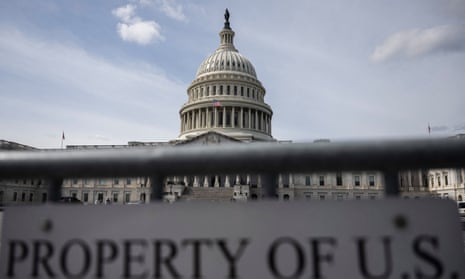Congress faces its third shutdown deadline of the month this week, as much of the federal government is expected to run out of funding by Friday at midnight.
Both chambers of Congress must approve six appropriations bills before Saturday to get the legislation to Joe Biden’s desk and avert a partial shutdown. Although the current fiscal year started more than five months ago, House Republicans have struggled to pass appropriations bills due to demands from hard-right members to include controversial provisions in the legislation.
As a result, Congress has been forced to pass four stopgap bills since the fiscal year began in October, and members hope they can finally conclude the appropriations process this week.
But disputes over the Department of Homeland Security’s budget repeatedly hampered negotiations, raising serious doubts about whether members would be able to pass a spending package in time to prevent a funding lapse.
The White House announced on Tuesday that negotiators had reached a deal on homeland security funding, but it remains unclear whether Congress will have enough time to pass the proposal before Saturday.
Here’s everything you need to know about the shutdown threat:
What bills must Congress pass?
Congress has to approve six full-year appropriations bills, which represent funding for about 70% of the federal government. Among other agencies, the departments of state, defense, homeland security, education and labor will all run out of funding at 12.01am on Saturday unless another spending package is approved.
Didn’t Congress already pass a funding bill?
Earlier this month, Congress approved a spending package that encapsulated six of the 12 full-year appropriations bills necessary for funding the federal government. The agencies covered by that package now have funding through the rest of this fiscal year, which ends on 30 September.
But under the terms of a stopgap bill passed late last month, the remaining six appropriations bills must be signed by 22 March to prevent a partial government shutdown.
What is holding up the talks?
Democrats and Republicans appear to have reached agreement on five of the six appropriations bills, but they repeatedly clashed over funding for the Department of Homeland Security due to arguments over money for border security measures.
The House speaker, Republican Mike Johnson, said on Tuesday that a deal had been struck on DHS funding, but the exact details of the proposal remain unclear. As of Tuesday afternoon, lawmakers were still waiting to see legislative text of the deal.
“House and Senate committees have begun drafting bill text to be prepared for release and consideration by the full House and Senate as soon as possible,” Johnson said on X, formerly known as Twitter.
The announcement comes weeks after congressional Republicans blocked a bipartisan border and national security deal that included more funding for Immigration and Customs Enforcement.
Does a shutdown appear likely at this point?
The exact timing of votes in the House and the Senate will determine whether a partial shutdown occurs on Saturday. House Republican leaders prefer to give members 72 hours to read legislation before a vote, and with full bill text now expected no earlier than Tuesday, it appears that a final House vote would probably take place on Friday.
That would leave the Senate with little time to approve the package before the shutdown deadline at midnight. Senators would have to unanimously agree on fast-tracking the legislation, and that task could prove difficult given past objections from some hard-right Republicans in the chamber, including Senator Rand Paul of Kentucky.
“Passing the second group of appropriations bills, of course, is not going to be easy,” the Senate majority leader, Democrat Chuck Schumer, said last week. “Democrats will continue working with Republicans to finish the job. That can only be done in a bipartisan way.”
If no agreement is reached on expediting the final Senate vote, it could trigger a partial shutdown on Saturday morning. But if the Senate can ultimately approve the package over the weekend, the shutdown would be short-lived and would have little impact on federal agencies.
If Congress can pass a funding package, when will this issue arise again?
Assuming Congress approves a spending package this week, the entire federal government will be funded through the end of the fiscal year, and lawmakers will not face another shutdown deadline until the end of September.
But it is worth noting how unusual it is to have Congress still haggling over government funding at this point in the calendar, when nearly half of the fiscal year has already elapsed. Underscoring how late Congress is on passing the appropriations bills, members of Biden’s cabinet will be on Capitol Hill this week to testify about the president’s proposed budget for the next fiscal year – even as this year’s spending levels remain up in the air.
